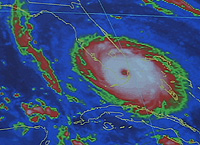 Forecasters are predicting another above normal hurricane season in the region. Therefore, it is critical to be prepared as this year’s hurricane season gets underway.
Forecasters are predicting another above normal hurricane season in the region. Therefore, it is critical to be prepared as this year’s hurricane season gets underway.
The National Oceanic and Atmospheric Administration’s (NOAA) forecast for the Atlantic, Caribbean Sea and Gulf of Mexico is calling for 12 to 18 named storms. They predict that 6 to 10 of these named storms will become hurricanes. It is also predicted that 3 to 6 of these will become major hurricanes.
The forecasters believe that unusually warm water in the Atlantic Ocean is the major reason why we should expect a busy hurricane season. The impact of the La Nina climate pattern may also contribute to the hectic season.
We should give credence to this forecast because it is similar to an earlier prediction coming out of Colorado State University that calls for 16 storms in the Atlantic basin. Also, NOAA forecasts for named storms have been on point in 6 out of the last 11 years.
Luckily, hurricanes are not surprises like tornadoes, earthquakes and volcanic eruptions. Because of this, we have ample time to prepare. Don’t become complacent and prepare for a hurricane, especially since its predicted to be a busy season. Preparation will help protect your family and home from danger.
Indeed, history suggests that South Florida is due for a hurricane strike. Therefore, this is certainly not the season to take lightly. We’ve been spared the last few years, but this could be the year where we are hit by another hurricane. Hurricanes are a fact of life living in South Florida. Although inevitable, they are not surprises like earthquakes or tsunamis. You can prepare and be ready for a hurricane.
Considering the increased odds of South Florida getting hit by a storm you should take the necessary steps to safeguard your property and family. One exercise that is a must is a review of your insurance policy to determine what is excluded from your policy. Most importantly, review what you’re supposed to do in the event your property is damaged in a windstorm. You should also check the financial strength of your insurance company, and stock up on food supplies.
—–
EXTENDED BODY:
Consider Your Options. Contact Us Today.
Before opening our law firm in 2006, our attorneys worked for some of the state’s, and nation’s, largest law firms, and worked representing the insurance companies for years. Our attorneys are now uniquely positioned to use that experience to assist individuals and businesses alike throughout Florida with their insurance claims. As a result, our attorneys are well versed in the impact insurance has on businesses, condominiums, and individuals alike. Our insurance litigation practice group is prepared to tackle your insurance claim.
Given our extensive experience litigating for, and against, insurance companies, our insurance litigation practice group is prepared to provide aggressive, efficient and effective representation on a broad spectrum of insurance claims in Florida for local, national, and international clients. We are prepared to advocate insurance claims at the pre-suit stage, trial, appellate and arbitration levels.
If you are facing a dispute over an insurance claim in Florida, contact Alvarez & Barbara, LLP, for a free and confidential consultation to discuss your rights.
Call us today toll free at 1-866-518-2913 or at 305-263-7700.